Did you know that about 96% of households' food gets tossed into landfills? And an average family of four spends about $1,500 on food that they never eat!
It's quite disheartening to acknowledge, but the truth is, we're facing a big problem with food waste globally. Think about it: those banana peels you toss out, the leftovers that go bad – it all piles up much faster than most of us realize.
Trying to cut down on this waste isn't a walk in the park, though. Sure, composting is an excellent method, but it's not always practical.
I remember trying to fit a compost bin in my tiny apartment – let's just say, it wasn't pretty. Plus, depending on your local climate and what you're tossing into the mix, turning your scraps into compost can be a slow process, sometimes taking up to a year.
But where there's a will, there's a way.
To solve the problems of the traditional compost bins, people have invented the compost machine. These electric food recycling machines, or electric composters, are game-changers, quickly transforming kitchen waste into something useful.
For this blog, I have tested four of the best compost machines in the market so that you can make the best purchase decision.
1. Lomi Classic: Best Overall
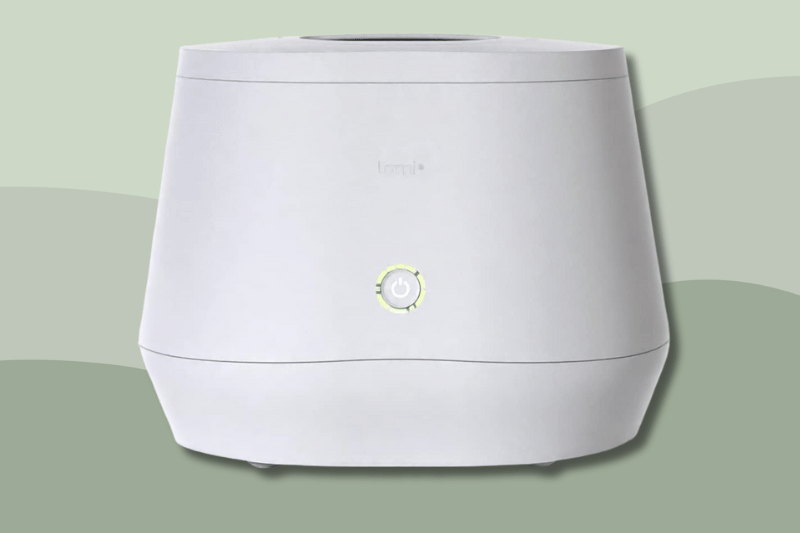
The Lomi Classic is a standout in the world of composting machines. Its superpower? It effortlessly shrinks the size and weight of your food scraps and soiled paper items like oily bags or used napkins and even tackles some tricky bioplastics that usually don't play well with home composting.
I was thrilled during my tests – it's a breeze to use, completely odor-free, and transforms your kitchen leftovers into a fluffy, mulch-like material.
What makes the Lomi Classic a game-changer are its three unique modes.
First up, the Eco Express, zipping through almost any food scrap – think cooked grains, fruit peels, coffee leftovers, and eggshells – in record time. This mode's magic turns waste into a substance perfect for plants or adding directly to your compost heap.
Next is the Grow Mode, which takes a bit longer (about 12 hours) but rewards you with ready-to-use compost, perfect for giving your plants some love. Lastly, the "Lomi Approved" mode, a special setting designed to break down specific bioplastics, ensuring you're composting safely and effectively.
The catch? It's a bit pricier than its rivals, and it's not a fan of tough stuff like bones or hard fruit pits, like those from peaches or avocados. But for a hassle-free, eco-friendly composting solution, Lomi Classic might just be worth it.
- Versatile Waste Processing: Handles food scraps, soiled paper, and certain bioplastics.
- Odor-Free Operation: Keeps your space smelling fresh.
- User-Friendly: Simple to use with effective results.
- Three Specialized Modes: Offers Eco Express, Grow Mode, and Lomi Approved for diverse composting needs.
- Efficient Composting: Quickly turns waste into nutrient-rich mulch.
- Higher Price Point: More expensive compared to similar models.
- Limited Processing: Struggles with bones and hard fruit pits.
- Longer Cycle Times: Some modes take up to 12 hours to complete.
2. Vitamix FoodCycler FC-50
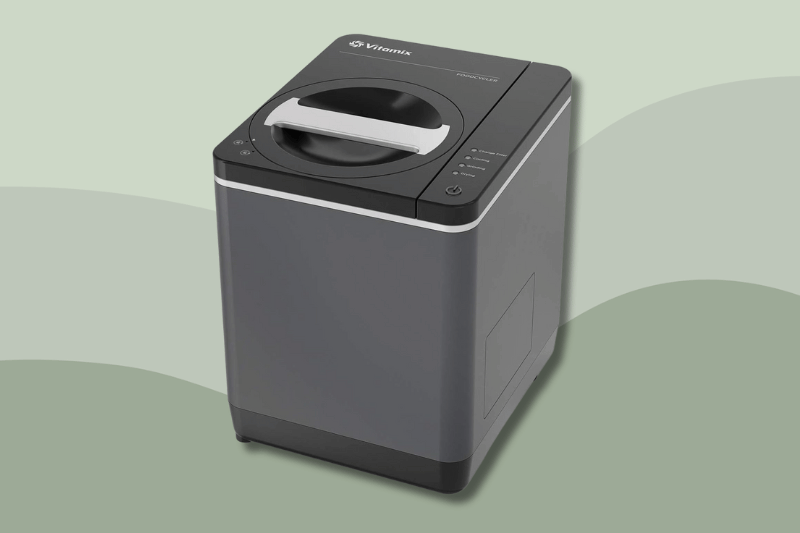
The Vitamix FoodCycler FC-50, the original champ of food recycling, scores a solid 8.5/10 in my book. Picture a hefty bread-maker – that's what it looks like. Its twist-off lid opens to a bucket where you toss your food scraps. Holding about a cubic foot, it's equipped with a carbon filter to keep odors at bay – trust me, you don't want to leave it out for too long, or it'll start to smell.
You're supposed to keep this gadget on your countertop, filling it up with kitchen waste like veggie scraps, pet food, or coffee grounds (just steer clear of oil and grease). Vitamix emphasizes variety for optimal results, so mix it up! However, there's some confusion about meats and bones – the guide suggests small amounts are okay, but the manual warns against adding any animal proteins to your soil.
Personally, I'd avoid meats altogether to dodge any risk of harmful bacteria.
When it's full, just pop the bucket into the FC-50, hit start, and let it work its magic, transforming your scraps into a finer mix in 4-8 hours. It's got this cool series of LED lights to keep you in the loop, and it locks up tight until the cycle's done.
The end product?
A dry, crumbly mix perfect for your garden. Just a heads-up, it did have a bit of trouble fully breaking down my coffee pods and some tougher scraps, leaving behind larger pieces.
- Compact Size: Fits easily in most kitchens.
- Odor Control: Carbon filter minimizes smells.
- User-Friendly: Simple setup and operation.
- Quick Composting: 4-8 hour cycle time.
- Progress Indicators: LED lights for cycle tracking.
- Confusing Meat Guidelines: Unclear advice on composting meats.
- Incomplete Breakdown: Struggles with tough scraps.
- Pest Attraction Risk: Larger chunks may attract animals.
3. Reencle Prime
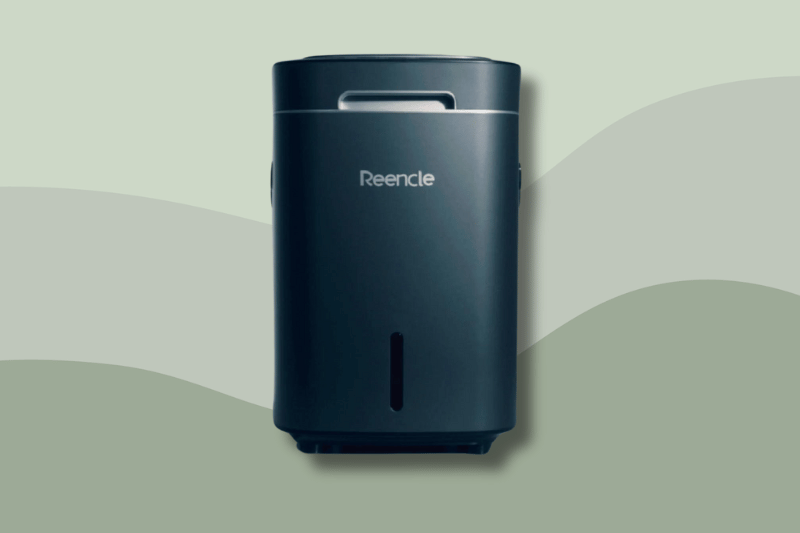
Reencle Prime (gets 8 out of 10 from me) brings the wonders of nature's recycling right into your kitchen. Picture a sophisticated trash bin with a smart lid that pops open with a simple foot gesture. Inside, it's a different story – a world where your kitchen leftovers transform into nutrient-rich compost, thanks to the included Reencle Microbe mix.
Setting up is a breeze. Just add water, the microbial mix, and then your food waste. It's quite the speedy little gadget, breaking down most scraps in a day, though tougher items like banana peels might take a tad longer. The magic lies in the ReencleMicrobe mix – a concoction of rice husks, vermiculite, friendly bacteria, ammonium sulfate, and wood pellets. Once you add it, these hardworking microbes keep at it, continuously breaking down your scraps as long as they're fed.
With its automatic lid and buttons for various functions like drying and purifying waste, Reencle Prime is the epitome of convenience. It's designed for continuous use – just keep adding waste, and it takes care of the rest, all while keeping odors at bay with its carbon filter.
But it's not all hands-off. Sometimes, you might catch a whiff of a pickle-like scent, or if the balance is off, a bit of a stink, signaling it's time to adjust the mix. And while it's quite the performer, handling up to 2.2 pounds of waste daily, the price tag is hefty, $499 after a 10% discount.
Is it worth it? For urban composting enthusiasts seeking a seamless, odor-free experience, it might just be the perfect kitchen companion.
- Efficient Composting: Quickly turns food waste into nutrient-rich compost.
- Versatile Waste Handling: Manages a variety of food scraps, including tough items.
- Continuous Operation: Designed for ongoing use, add waste anytime.
- Odor Control: Integrated carbon filter minimizes unpleasant smells.
- User-Friendly: Automatic lid and intuitive buttons for ease of use.
- Occasional Odors: Might emit a pickle-like scent when opened or if balance is off.
- Maintenance Required: Needs periodic adjustments to maintain microbial balance.
- Limited to Certain Bacteria: Requires specific conditions and microbes for optimal function.
4. BeyondGREEN All-Electric Kitchen Composter
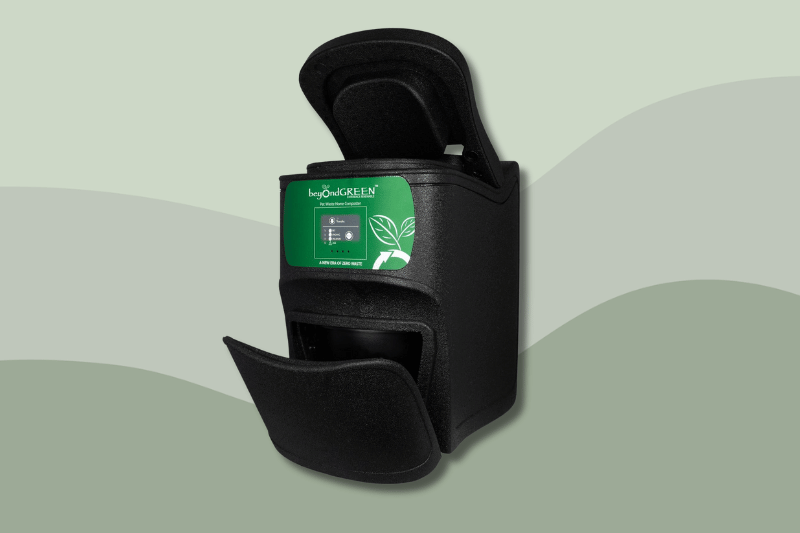
The BeyondGreen Kitchen Waste Composter offers a unique take on turning your kitchen scraps into garden gold. Unlike its counterparts that dry out the waste, this one heats and stirs everything in an insulated container.
This cozy environment is perfect for natural bacteria to work their magic on the mix of "brown" (wood chips) and "green" (food waste) you feed them. Getting started is simple – just add the included wood chips and a pinch of baking soda.
However, patience is key here. This isn't your quick fix, as the whole process unfolds over days, not hours. Expect to wait at least a week to see the fruits of your (and the microbes') labor.
There's a slight catch, though. When you lift the lid to toss in more scraps, brace yourself – it's quite the aromatic experience, reminiscent of a pile of decomposing leaves. Because of this, it's wise to station the composter in a spot like the garage or basement, somewhere a bit removed from your main living space.
For those tougher kitchen scraps, a little pre-prep goes a long way. Chopping up things like banana peels and stringy veggies helps, as this device stirs rather than grinds the waste.
When it's all done, just hit the transfer button, and voila – the compost is neatly deposited into a container for easy retrieval. This resulting compost is usually well-mixed and rich, though you might encounter the occasional stubborn chunk of food or bioplastic, like from compostable coffee pods.
For a smoother finish, a bit of extra crushing or mixing might be needed before or after composting.
- Natural Composting Process: Encourages natural bacterial breakdown without dehydrating the waste.
- Insulated Environment: Heat-resistant foam maintains optimal conditions for composting.
- Simple Setup: Just add wood chips and baking soda to get started.
- Efficient Composting: Produces well-mixed, rich compost over time.
- Straightforward Collection: Easy transfer of finished compost into a container.
- Slow Process: Takes at least a week to produce compost.
- Odor Issues: Releases strong smells when opened, requiring strategic placement.
- Prep Work Required: Tougher waste needs chopping for better results.
- Incomplete Breakdown: Some chunks may remain, needing further composting or mixing.
What Is a Compost Machine?
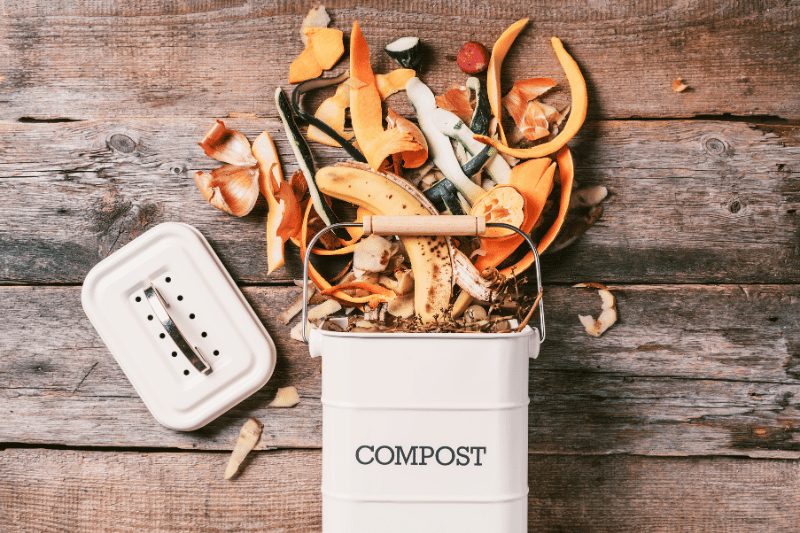
What exactly is a compost machine? Think of it as your personal eco-warrior, a standalone small kitchen appliance that breaks down food waste into compost or fertilizer by hastening the organic composting process.
You feed it your kitchen scraps or garden leftovers, and in return, it gives you rich manure, perfect for nourishing your plants.
Now, let's face it, composting the traditional way can feel like watching paint dry. It's a slow dance with nature that can take ages. That's where a compost machine comes into play. It's like hitting the fast-forward button on the whole process. Businesses, in particular, find these machines a lifesaver. Imagine the heaps of waste they deal with daily – without a speedy solution like this, it'd be mountain-high in no time!
But how does it work? Well, the compost machine is like a mini ecosystem. It creates the ideal conditions – just the right temperature, moisture, and airflow – that get those microorganisms working overtime, breaking down waste at an impressive speed.
How Do Compost Machines Work?
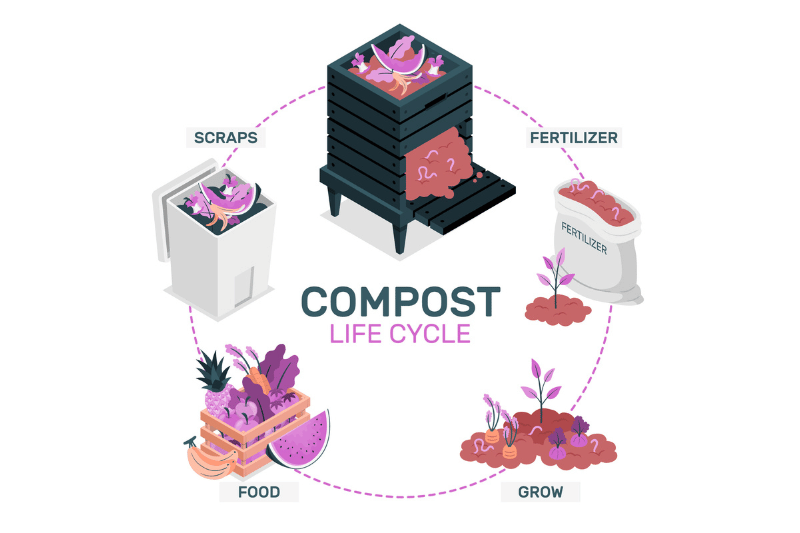
Ever wondered how those nifty electric composters turn your kitchen leftovers into garden gold? Let’s break it down into easy-to-understand steps.
- Warm-Up Act: The composter starts its magic show by warming up your food scraps to around 160 degrees Fahrenheit. This isn't just to cook them a second time; it’s a clever move to zap any unwanted germs and pesky weed seeds. It’s like giving your scraps a mini sauna session, drying them out completely. I remember the first time I used mine, I was amazed at how it could make everything bone-dry, ensuring nothing icky was left.
- The Grind: Next, these dried-out scraps are transformed into tiny granules. It’s kind of like watching a coffee grinder at work, turning beans into grounds. Only in this case, it’s your leftovers getting ready to start a new life.
- Cool Down and Collect: After the grinding performance, the composter takes a breather, letting the compost cool down. This pause is crucial, ensuring you can handle the compost without turning it into a hot potato. Once cooled, it’s ready to be removed and admired.
The Special Features
Some electric composters like to shake things up by tumbling the waste, speeding up the drying process like a salad spinner removing water. Others are designed with separate chambers, allowing you to continuously feed in scraps without waiting for one batch to finish.
And for those who like a bit of versatility, there are models that have settings for different materials, including meat and certain biodegradable plastics.
I’ve found that the ability to add scraps continuously is a game-changer, especially during those busy cooking days. It feels like having an assistant in the kitchen that’s always ready to take on more.
What’s Happening Behind the Scenes?
While your scraps are being transformed, the composter is doing some serious air cleaning. The air released during the process passes through a carbon filter, stripping away any odors and pollutants. It’s pretty eco-friendly too, using about as much electricity as warming your room for an hour.
How Much Does a Compost Machine Cost?
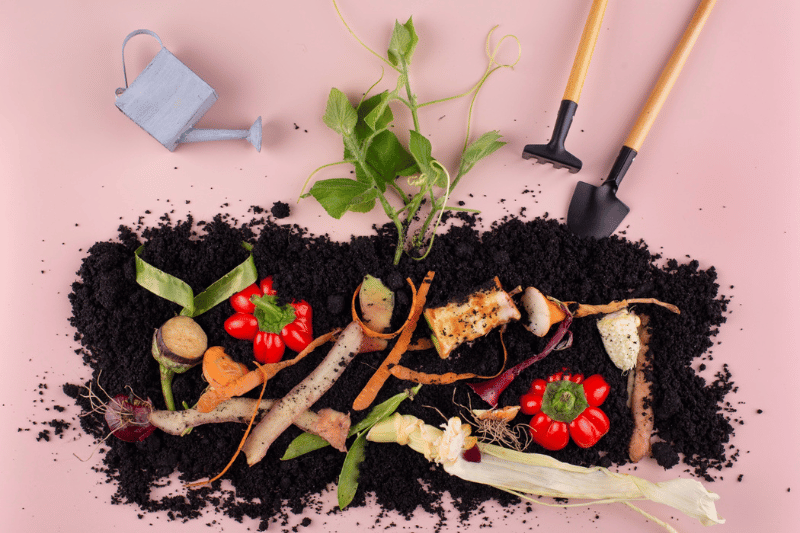
When it comes to electric composters, prices can vary widely, typically ranging from $250 to $500. This variation depends largely on the brand, features, and capacity of the composter. Understanding this price range can help you budget for an electric composter that fits your needs and expectations.
For example, Lomi Composter costs about $450 and Vitamix FoodCycler FC-50 is priced at approximately $400.
When shopping for an electric composter within this price range, it's important to consider what features are most important to you and how much you're willing to invest in those features.
Pros and Cons of Compost Machines
Considering a compost machine? Here's a bite-sized guide, comparing it to traditional compost bins.
Compost machines speed up the breakdown of kitchen scraps, unlike traditional bins which take months. As a result, they're faster, turning waste into compost quickly. Plus, they're eco-friendly, reducing greenhouse gases more efficiently than bins. Even throwing the compost away cuts carbon emissions, unlike with bins.
Space-wise, machines are compact, taking up less room than bins. They're also energy-efficient, using minimal electricity. However, they have limits, processing only small amounts of scraps at a time, unlike bins which can handle more. Cost is another factor; machines are pricier, whereas bins are almost free.
After composting, the machine's output needs a week to cure, similar to bins. But patience is key; waiting longer ensures better soil for planting. Both methods advise against adding meat or high sodium foods, which harm plant growth.
In short, compost machines offer speed and eco-benefits over bins but come with their own set of considerations. Whether it's space, cost, or usage, choose what aligns with your green goals.
Are Composting Machines Worth It?
Absolutely, yes! Here’s why, in super quick points:
- Fast Results: Compost machines work quick, turning food scraps into garden gold way faster than old-school methods. Perfect for seeing progress without the wait.
- Eco-Friendly: They're great for the planet, cutting down on waste and greenhouse gases. It feels good to do good!
- Easy to Fit: Small and power-efficient, these machines can fit into your life without hassle. No big space? No problem.
- Cost vs. Benefit: Yes, they cost a bit upfront, but the payoff in convenience and impact is huge. Think of it as an investment in a greener future.
- Simple to Use: Even with a few rules on what not to compost, they're pretty straightforward. Less stress, more success.
So, are compost machines worth it? For those looking to make a positive environmental impact, embrace sustainable living practices, and enjoy the benefits of rich, homemade compost for their gardens, the answer is a resounding yes.
By investing in a compost machine, you're not just purchasing a tool; you're committing to a greener, more sustainable future.
Gardening
4 Best Compost Machines for Beginner Composters
Written by : Samira Tasneem | Published: February 15, 2024
Contents
Say goodbye to slow composting! Our blog reveals the top compost machines that make soil enrichment fast, easy, and environmentally friendly.
Did you know that about 96% of households' food gets tossed into landfills? And an average family of four spends about $1,500 on food that they never eat!
It's quite disheartening to acknowledge, but the truth is, we're facing a big problem with food waste globally. Think about it: those banana peels you toss out, the leftovers that go bad – it all piles up much faster than most of us realize.
Trying to cut down on this waste isn't a walk in the park, though. Sure, composting is an excellent method, but it's not always practical.
I remember trying to fit a compost bin in my tiny apartment – let's just say, it wasn't pretty. Plus, depending on your local climate and what you're tossing into the mix, turning your scraps into compost can be a slow process, sometimes taking up to a year.
But where there's a will, there's a way.
To solve the problems of the traditional compost bins, people have invented the compost machine. These electric food recycling machines, or electric composters, are game-changers, quickly transforming kitchen waste into something useful.
For this blog, I have tested four of the best compost machines in the market so that you can make the best purchase decision.
1. Lomi Classic: Best Overall
The Lomi Classic is a standout in the world of composting machines. Its superpower? It effortlessly shrinks the size and weight of your food scraps and soiled paper items like oily bags or used napkins and even tackles some tricky bioplastics that usually don't play well with home composting.
I was thrilled during my tests – it's a breeze to use, completely odor-free, and transforms your kitchen leftovers into a fluffy, mulch-like material.
What makes the Lomi Classic a game-changer are its three unique modes.
First up, the Eco Express, zipping through almost any food scrap – think cooked grains, fruit peels, coffee leftovers, and eggshells – in record time. This mode's magic turns waste into a substance perfect for plants or adding directly to your compost heap.
Next is the Grow Mode, which takes a bit longer (about 12 hours) but rewards you with ready-to-use compost, perfect for giving your plants some love. Lastly, the "Lomi Approved" mode, a special setting designed to break down specific bioplastics, ensuring you're composting safely and effectively.
The catch? It's a bit pricier than its rivals, and it's not a fan of tough stuff like bones or hard fruit pits, like those from peaches or avocados. But for a hassle-free, eco-friendly composting solution, Lomi Classic might just be worth it.
Pros
Cons
2. Vitamix FoodCycler FC-50
The Vitamix FoodCycler FC-50, the original champ of food recycling, scores a solid 8.5/10 in my book. Picture a hefty bread-maker – that's what it looks like. Its twist-off lid opens to a bucket where you toss your food scraps. Holding about a cubic foot, it's equipped with a carbon filter to keep odors at bay – trust me, you don't want to leave it out for too long, or it'll start to smell.
You're supposed to keep this gadget on your countertop, filling it up with kitchen waste like veggie scraps, pet food, or coffee grounds (just steer clear of oil and grease). Vitamix emphasizes variety for optimal results, so mix it up! However, there's some confusion about meats and bones – the guide suggests small amounts are okay, but the manual warns against adding any animal proteins to your soil.
Personally, I'd avoid meats altogether to dodge any risk of harmful bacteria.
When it's full, just pop the bucket into the FC-50, hit start, and let it work its magic, transforming your scraps into a finer mix in 4-8 hours. It's got this cool series of LED lights to keep you in the loop, and it locks up tight until the cycle's done.
The end product?
A dry, crumbly mix perfect for your garden. Just a heads-up, it did have a bit of trouble fully breaking down my coffee pods and some tougher scraps, leaving behind larger pieces.
Pros
Cons
3. Reencle Prime
Reencle Prime (gets 8 out of 10 from me) brings the wonders of nature's recycling right into your kitchen. Picture a sophisticated trash bin with a smart lid that pops open with a simple foot gesture. Inside, it's a different story – a world where your kitchen leftovers transform into nutrient-rich compost, thanks to the included Reencle Microbe mix.
Setting up is a breeze. Just add water, the microbial mix, and then your food waste. It's quite the speedy little gadget, breaking down most scraps in a day, though tougher items like banana peels might take a tad longer. The magic lies in the ReencleMicrobe mix – a concoction of rice husks, vermiculite, friendly bacteria, ammonium sulfate, and wood pellets. Once you add it, these hardworking microbes keep at it, continuously breaking down your scraps as long as they're fed.
With its automatic lid and buttons for various functions like drying and purifying waste, Reencle Prime is the epitome of convenience. It's designed for continuous use – just keep adding waste, and it takes care of the rest, all while keeping odors at bay with its carbon filter.
But it's not all hands-off. Sometimes, you might catch a whiff of a pickle-like scent, or if the balance is off, a bit of a stink, signaling it's time to adjust the mix. And while it's quite the performer, handling up to 2.2 pounds of waste daily, the price tag is hefty, $499 after a 10% discount.
Is it worth it? For urban composting enthusiasts seeking a seamless, odor-free experience, it might just be the perfect kitchen companion.
Pros
Cons
4. BeyondGREEN All-Electric Kitchen Composter
The BeyondGreen Kitchen Waste Composter offers a unique take on turning your kitchen scraps into garden gold. Unlike its counterparts that dry out the waste, this one heats and stirs everything in an insulated container.
This cozy environment is perfect for natural bacteria to work their magic on the mix of "brown" (wood chips) and "green" (food waste) you feed them. Getting started is simple – just add the included wood chips and a pinch of baking soda.
However, patience is key here. This isn't your quick fix, as the whole process unfolds over days, not hours. Expect to wait at least a week to see the fruits of your (and the microbes') labor.
There's a slight catch, though. When you lift the lid to toss in more scraps, brace yourself – it's quite the aromatic experience, reminiscent of a pile of decomposing leaves. Because of this, it's wise to station the composter in a spot like the garage or basement, somewhere a bit removed from your main living space.
For those tougher kitchen scraps, a little pre-prep goes a long way. Chopping up things like banana peels and stringy veggies helps, as this device stirs rather than grinds the waste.
When it's all done, just hit the transfer button, and voila – the compost is neatly deposited into a container for easy retrieval. This resulting compost is usually well-mixed and rich, though you might encounter the occasional stubborn chunk of food or bioplastic, like from compostable coffee pods.
For a smoother finish, a bit of extra crushing or mixing might be needed before or after composting.
Pros
Cons
What Is a Compost Machine?
What exactly is a compost machine? Think of it as your personal eco-warrior, a standalone small kitchen appliance that breaks down food waste into compost or fertilizer by hastening the organic composting process.
You feed it your kitchen scraps or garden leftovers, and in return, it gives you rich manure, perfect for nourishing your plants.
Now, let's face it, composting the traditional way can feel like watching paint dry. It's a slow dance with nature that can take ages. That's where a compost machine comes into play. It's like hitting the fast-forward button on the whole process. Businesses, in particular, find these machines a lifesaver. Imagine the heaps of waste they deal with daily – without a speedy solution like this, it'd be mountain-high in no time!
But how does it work? Well, the compost machine is like a mini ecosystem. It creates the ideal conditions – just the right temperature, moisture, and airflow – that get those microorganisms working overtime, breaking down waste at an impressive speed.
How Do Compost Machines Work?
Ever wondered how those nifty electric composters turn your kitchen leftovers into garden gold? Let’s break it down into easy-to-understand steps.
The Special Features
Some electric composters like to shake things up by tumbling the waste, speeding up the drying process like a salad spinner removing water. Others are designed with separate chambers, allowing you to continuously feed in scraps without waiting for one batch to finish.
And for those who like a bit of versatility, there are models that have settings for different materials, including meat and certain biodegradable plastics.
I’ve found that the ability to add scraps continuously is a game-changer, especially during those busy cooking days. It feels like having an assistant in the kitchen that’s always ready to take on more.
What’s Happening Behind the Scenes?
While your scraps are being transformed, the composter is doing some serious air cleaning. The air released during the process passes through a carbon filter, stripping away any odors and pollutants. It’s pretty eco-friendly too, using about as much electricity as warming your room for an hour.
How Much Does a Compost Machine Cost?
When it comes to electric composters, prices can vary widely, typically ranging from $250 to $500. This variation depends largely on the brand, features, and capacity of the composter. Understanding this price range can help you budget for an electric composter that fits your needs and expectations.
For example, Lomi Composter costs about $450 and Vitamix FoodCycler FC-50 is priced at approximately $400.
When shopping for an electric composter within this price range, it's important to consider what features are most important to you and how much you're willing to invest in those features.
Pros and Cons of Compost Machines
Considering a compost machine? Here's a bite-sized guide, comparing it to traditional compost bins.
Compost machines speed up the breakdown of kitchen scraps, unlike traditional bins which take months. As a result, they're faster, turning waste into compost quickly. Plus, they're eco-friendly, reducing greenhouse gases more efficiently than bins. Even throwing the compost away cuts carbon emissions, unlike with bins.
Space-wise, machines are compact, taking up less room than bins. They're also energy-efficient, using minimal electricity. However, they have limits, processing only small amounts of scraps at a time, unlike bins which can handle more. Cost is another factor; machines are pricier, whereas bins are almost free.
After composting, the machine's output needs a week to cure, similar to bins. But patience is key; waiting longer ensures better soil for planting. Both methods advise against adding meat or high sodium foods, which harm plant growth.
In short, compost machines offer speed and eco-benefits over bins but come with their own set of considerations. Whether it's space, cost, or usage, choose what aligns with your green goals.
Are Composting Machines Worth It?
Absolutely, yes! Here’s why, in super quick points:
So, are compost machines worth it? For those looking to make a positive environmental impact, embrace sustainable living practices, and enjoy the benefits of rich, homemade compost for their gardens, the answer is a resounding yes.
By investing in a compost machine, you're not just purchasing a tool; you're committing to a greener, more sustainable future.
Samira Tasneem
Samira is an Electronics and Communications Engineer by profession, but deep inside, her heart is a nomad! She's a state champion debater, a public speaker, a scriptwriter, a theater actress, but most importantly — A GREEN CITIZEN! She thinks of herself as a storyteller who thrives on enjoying the life at fullest and telling everyone the tales of life.
Quick Links
Green Living Guides
Green Jobs
Inspiring Green News
Green Directory
Green Store
Electronics Recycling
Category: Gardening, Product Review, Sustainable Living